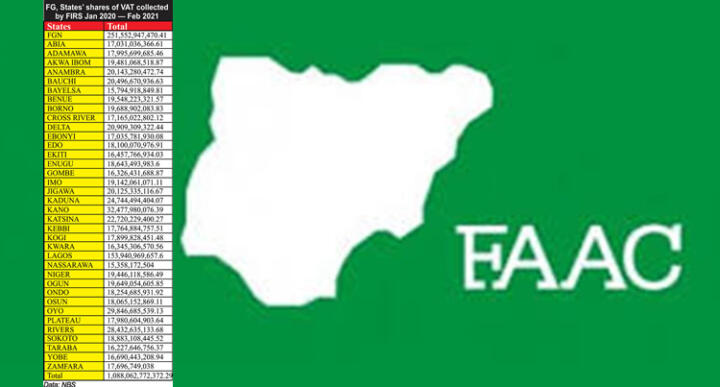Nigeria’s oil tax revenue plunged by 53% in the first half of 2025, according to the latest report released by the Federation Account Allocation Committee (FAAC). The steep decline underscores the ongoing challenges facing the country’s petroleum sector despite rising global oil prices and efforts to stabilise domestic production.
The FAAC report revealed that oil-related taxes, including Petroleum Profit Tax (PPT) and royalties, fell drastically from over N3.2 trillion recorded in the same period of 2024 to about N1.5 trillion in 2025. This represents a significant shortfall that has impacted the monthly allocations shared among the three tiers of government.

According to the report, the decline was primarily due to lower crude oil production volumes, persistent crude theft, pipeline vandalism, and disruptions in export operations. It also cited increased operational costs, delays in remittances by some international oil companies (IOCs), and exchange rate volatility as contributing factors.
Despite Nigeria’s daily crude production averaging around 1.35 million barrels per day in the period under review, this figure remains well below the 1.78 million barrels per day benchmark set in the 2025 budget. The shortfall in production has limited the country’s capacity to take advantage of higher international oil prices, which hovered between $80 and $90 per barrel for most of the year.
The FAAC report also highlighted that while oil tax revenue fell sharply, non-oil revenue sources such as Value Added Tax (VAT), Company Income Tax (CIT), and import duties saw moderate growth. The diversification of the revenue base, according to FAAC, provided some cushion against the heavy losses from the oil sector.
A breakdown of the figures showed that PPT collections dropped by more than half compared to 2024 levels, reflecting a combination of reduced taxable profits and lower remittances from oil-producing companies. Royalties and rent on oil and gas leases also declined, contributing to the overall 53% revenue contraction.
Economic analysts have expressed concern over the sharp decline, warning that it could worsen fiscal pressures on the federal and state governments. Nigeria’s budget deficit, already widened by high debt servicing and subsidy-related costs, is expected to grow further if the trend continues.
Dr. Chukwudi Anene, an energy economist, said the decline in oil tax revenue is a wake-up call for Nigeria to accelerate diversification efforts and strengthen accountability in the oil sector. “The fact that we are losing more than half of our oil tax revenue in a year when oil prices are favourable shows that the problem is largely structural and operational. Until Nigeria fixes crude theft, production inefficiency, and transparency issues, this revenue crisis will persist,” he said.
Anene also noted that the country’s failure to meet its OPEC quota and the underperformance of local refineries have limited value creation within the sector. “We are producing below capacity, exporting less, and importing refined products at a higher cost. This imbalance continues to strain public finances,” he added.
The FAAC report further revealed that states reliant on monthly federal allocations are already facing budgetary strain due to reduced oil earnings. Several state governments have reportedly struggled to meet salary obligations and implement capital projects, relying heavily on overdrafts and loans to bridge the gap.
In response, the Federal Government has pledged to intensify measures to curb crude theft and improve revenue remittances. The Nigerian Upstream Petroleum Regulatory Commission (NUPRC) recently announced plans to enhance metering systems, enforce stricter compliance among operators, and deploy new technologies for monitoring oil production and export activities.
Speaking on the matter, the Minister of Finance and Coordinating Minister of the Economy, Wale Edun, said the government is working to stabilise revenue inflows through reforms in both the oil and non-oil sectors. “We are taking concrete steps to improve accountability in the oil industry, strengthen fiscal discipline, and ensure that all due revenues are collected and remitted promptly,” he stated.
He added that ongoing reforms in the Nigerian National Petroleum Company Limited (NNPC Ltd) and the implementation of the Petroleum Industry Act (PIA) would help improve governance, reduce leakages, and enhance the overall performance of the sector.
Meanwhile, the FAAC report noted that the federation’s total distributable revenue for August 2025 stood at approximately N1.57 trillion, compared to N2.02 trillion shared in the same month of 2024 — a reflection of the declining oil contributions. Non-oil taxes accounted for a larger share of the total distribution, underscoring the growing importance of domestic tax collection and diversification efforts.
Financial experts have urged the government to expand investments in renewable energy, gas development, and solid minerals to reduce dependence on crude oil revenues. They also recommended policy consistency, improved regulatory oversight, and increased private sector participation in the energy value chain.
As Nigeria grapples with the effects of reduced oil revenue, the need for comprehensive fiscal reforms has become even more urgent. With declining oil tax receipts and rising expenditure pressures, the country’s ability to sustain economic growth and fund critical infrastructure could be at risk.
If crude production and efficiency levels do not improve significantly in the coming quarters, experts warn that the fiscal deficit could widen further, leading to more borrowing and inflationary pressures.
For now, FAAC’s 53% oil tax revenue crash serves as a stark reminder of Nigeria’s vulnerability to oil sector disruptions — and the pressing need to accelerate the shift towards a more diversified and resilient economy.
Support InfoStride News' Credible Journalism: Only credible journalism can guarantee a fair, accountable and transparent society, including democracy and government. It involves a lot of efforts and money. We need your support. Click here to Donate
